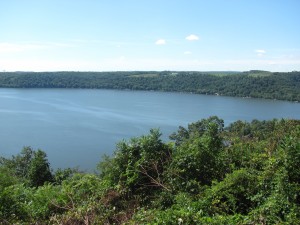Pa. leases more than 1,400 acres under rivers and streams to drillers
-
Marie Cusick

Scott LaMar/WITF
The most recent streambed lease agreement gives Chesapeake Energy the rights to extract gas from under 1,092 acres of the Susquehanna River.
Over the past year the state Department of Conservation and Natural Resources has raised nearly $5.9 million by quietly leasing more than 1,400 acres of mineral rights to gas companies underneath publicly-owned waterways.
The most recent lease agreement— signed just over two weeks ago– gives Chesapeake Energy the rights to extract gas from under 1,092 acres of the Susquehanna River in Wyoming and Bradford Counties for five years.
The department received $4,000 per acre, which amounted to a nearly $4.4 million signing bonus. When gas production begins, the lease calls for a 20 percent royalty.
The state has entered into a total of nine lease agreements of streambeds since March 2012, according to Governor Corbett’s press secretary Jay Pagni. Pennsylvania waterways are considered publicly-owned if they are, or ever have been, used for travel or commerce. DCNR maintains an interactive map of public streambeds on its website.
Other lease agreements executed this year include 80 acres to Vantage Energy in at Ten Mile Creek in Greene County, 57 acres to Chevron at Dunkard Creek in Greene County, and 18.7 acres to ExxonMobil subsidiary XTO Energy at Black Lick Creek in Indiana County.
Former DCNR Secretary John Quigley, who served under Governor Ed Rendell, a Democrat, says he first became aware that gas companies were drilling under publicly-owned streams and rivers around 2009.
He says DCNR executed streambed leases as an enforcement action to collect money that was owed to the Commonwealth. He doesn’t recall how many occurred during his time at the agency.
“The leases were originally intended to get companies that had already done drilling to pay what was rightfully called for under the law,” he says. “We worked with DEP to figure out who’s drilling underneath state-owned lands. This was all activity that had been permitted for years.”
Pagni says the state has not sought to get retroactive payments from drillers.
Mark Szybist is an attorney with the environmental group, PennFuture, and he believes the stream leases may be at odds with Rendell’s 2010 executive order, which placed a moratorium on new leasing of “lands owned and managed” by DCNR for oil and gas development.
“If you read the executive order, it prohibits leasing of any lands administered by DCNR–not just state forests or state parks,” says Szybist. “So technically these leases would appear to violate the executive order, even if this is not the leasing Rendell had in mind.”
Pagni says the streambed leases don’t violate the executive order.
“Lands, along with oil, gas and other mineral rights, underlying navigable waters of the Commonwealth are owned by the Commonwealth, not DCNR,” he writes in an email. “[The executive order] is clearly intended to restrict leasing activity associated with state park and forest land.”
Governor Corbett has said in the near future he plans to overturn the Rendell moratorium and open up more state park and forest land for drilling by issuing a new executive order which places a moratorium on leasing that would create an additional surface disturbance.
















